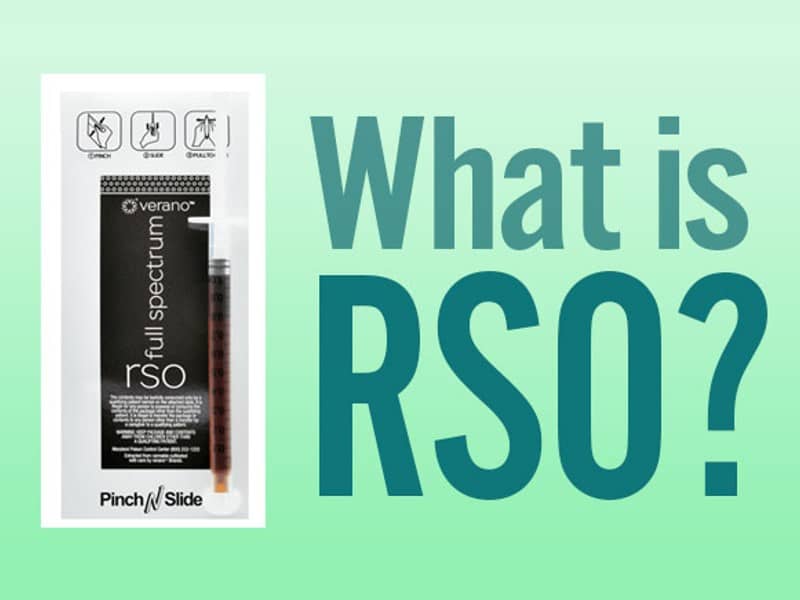When I started writing about medical cannabis, it didn’t take long for me to discover Rick Simpson. In 2007, he produced an extremely concentrated and potent form of high-THC cannabis oil known as RSO (Rick Simpson Oil) that he used to cure his own skin cancer. He never sold it and he encouraged people to make their own oil at home. These days, RSO is available at many medical cannabis dispensaries across the country.
The term RSO has come to be used interchangeably with FECO (Full Extract Cannabis Oil) and FSCO (Full Spectrum Cannabis Oil. While they are all very similar in their powerful benefits, they are all slightly different. This article explains the benefits of RSO, the conditions it treats, how it is produced and the dosing protocol. I think it is important to explain the differences between the 3 different terms; RSO, FECO and FSCO.
For simplicity’s sake, I will use the term RSO except when I explain the differences in processing.
RSO is the most concentrated, powerful medical cannabis product available today. It is produced by extracting all of the medicinal compounds from raw cannabis without burning them off or processing them out. These include cannabinoids, terpenes, proteins, phenols, esters and flavonoids.
Conditions that RSO may treat:
- Many types of cancers
- Anxiety and depression
- Neurological conditions such as MS, ALS, Alzheimer’s Disease, Parkinson’s Disease, Dementia
- Rheumatoid and Osteoarthritis
- PTSD
- Asthma
- Eating Disorders
- High Cholesterol
- Fibromyalgia
- Insomnia
- High Blood Pressure
- AIDS
- Chronic pain
- Gastrointestinal disorders
Chronic inflammation is the characteristic that links all of these illnesses and conditions. Medical cannabis has been proven to be one of the most effective anti-inflammatory medications available with the fewest adverse side effects.
Dosing
The treatment protocol that Rick Simpson established is 60 grams of RSO over a 90 day period. That amount of RSO can cause an intense reaction and can be difficult for patients to tolerate. As a result, Simpson developed an incremental dosing regimen as follows:
- Week 1: 3 doses/per day of 1/2 to 1 drop the size of a grain of rice
- Weeks 2-5: Double the dosage each time until reaching 1 gram/day
- Weeks 5-12: Continue with 1 gram/day until reaching 60 grams
Dosing For New Patients
Because of its intensity, it is recommended that new patients start with a dose measuring half the size of a grain of race. Wait 90 minutes to assess the effects before deciding whether or not to take another dose.
Because its THC content is about 47%, it is not uncommon for patients to sleep a lot at the beginning of their treatment regime. If they have a life-threatening illness, sleep is crucial in their healing.
Because of the high cost of purchasing RSO at this level of treatment protocol, Simpson highly recommends making your own at home, if possible. Of course, not everyone has access to the amount of flower necessary to produce 60 grams of RSO. Many patients may also not feel knowledgeable enough to make their own medicine.
Considerations When Choosing RSO at a Dispensary
- Was it made using 100% organic cannabis?
- Was the final product tested for pollutants and verified as bona fide?
- Know which strains were used
- Was it made from only cannabis flower or cannabis flower and leaves?
- Which cannabinoid was dominant?
- Was the cultivator reputable?
- Have other patients recommended it?
RSO vs FECO vs FSCO
The distinction between these 3 has to do with the extraction process; which, if any solvents were used, and if heat was applied during the extraction process.
It is worthy to note that when Rick Simpson started producing his oil, he used naphtha or butane to extract the oil. It is highly flammable and potentially poisonous. That is what differentiated RSO from FECO. Most recently, he recommends using denatured alcohol, CO2, dry ice or just cold water for the extraction process.
Different Processes Used To Make RSO Oil
- Everclear (outlawed in some states)
- 190 Proof Food Grade USP Non Denatured Alcohol
- Dry ice extraction method
- Cold water rinse followed by vaporization
- Butane (Rick Simpson used butane when he first started, but since it is not only poisonous but also highly flammable, he recommends other extraction processes)
FECO
Full Extract Cannabis Oil contains almost all the medicinal compounds found in the cannabis plant. The extraction process involves applying heat in order to remove the solvent which decarboxylates the cannabinoids into their neutral form. As a result, there may be changes in the terpene profile. Denatured alcohol, dry ice and CO2 are some of the different methods used for extraction.
FSCO
Full Spectrum Cannabis Oil preserves all the cannabinoids produced by the trichome glands of the cannabis plant in their acidic forms; THCa, CBDa and CBGa. Since no heat is applied in the process, there is neither a decarboxylation process nor a psychotropic effect. All these compounds are produced in the lipid and fat-based trichomes of the cannabis plant. The extraction process leaves behind the non-medicinal fats, waxes and lipids which provide the structure for all the medicinal compounds of cannabis.
The following cannabis extracts are considered to be FSCO:
- Sauce
- Live resin
- High Terpene Full Spectrum Extract (HTFSE)
- High Cannabinoid Full Spectrum Extract (HCFSE)
It is noteworthy to mention that the available compounds of any given strain are unique to each cultivar. Its chemical makeup is dependent on when it was extracted from the plant, based on genetic and environmental factors.
Here is a video of Mike Wise, a cannabis patient, activist, grower and producer of RSO, demonstrating his technique. He was able to cure himself of Crohn’s Disease and now he makes it for other people.
He extracts 1 lb of high-indica flower using 190 proof alcohol which produces 60 grams of RSO.
He recommends 3 ways to ingest the RSO:
- Orally
- Apply to upper gums
- Suppositories which he makes using gel capsules. He believes this method provides the most bioavailability of the cannabis compounds.
Bloom Medicinals will be having their first Cooking with RSO event! Click here for more information.
Sources:
Thestreet.com, Rick Simpson Oil (RSO): Benefits, Effects and Research in 2018, Oct 29, Anne Sraders
Cannabisnow.com, Strain Review: Understanding the Power of FECO, Feb 1, 2015
Liwt.org, A Guide to FECO, October 16, Lisa Kush
Menofhope.ca, The Benefits of RSO, Dec 5, 2017
Weedmaps.com, Full Spectrum Extracts: Definition and Information

